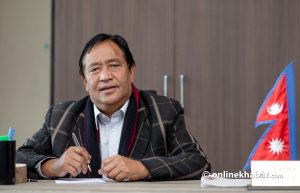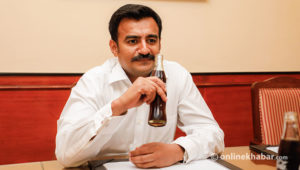Prajwal Parajuly grew up in Gangtok, Sikkim in India. He was educated at Truman State University in Kirksville, Missouri, and the University of Oxford. Parajuly has two books under his belt: The Gurkha’s Daughter (a collection of short stories) and Land Where I Flee (a novel). He was recently in Kathmandu. OnlineKhabar caught up with him to talk to him about his books, his love for the Nepali language, and the experience of being a Nepali-speaking person in India.
Do you remember your first time in Kathmandu?
It was a long, long time ago. I grew up in Gangtok, which is still an extremely small town. So Kathmandu was the closest big city we could come to without having to worry about our wallet being snatched. We grew up with stories of how big cities in India were full of scumbags who are out to swindle you.
So for us, Kathmandu was a safe city. I have a very good memory of going up the escalator one winter in 1987-88 in Bishal Bazaar; I was around three then, it was the highlight of my visit here.
I also remember how shocked I was when I learned that people referred to Wai Wai as chau chau.
You said people from your city would feel safe here in Kathmandu. Was it because of the language?
I think it was because we were familiar with the culture and the language. You know, if I am in the middle of Massachusetts and I run into a Nepali-speaking person, I am more excited than I would be meeting a Hindi-speaking person.
And it could also be attributed to the entire hills vs plains dichotomy going on here. I blame it on the knowledge we received from our elders about the plains. Everyone said that people in the hills and the mountains are not out to trick you or rob you, that they are simple people.
We were talking about how people who speak the same language connect easily. Talking of language, you’ve said in one of your interviews that your book ‘Land Where I Flee’ is your love letter to the Nepali language.
I am one of those people who are far more comfortable writing and speaking in English than in Nepali, which is tragic. I have tried to be respectful to Nepali in many ways; I attempted to translate the first story of The Gurkha’s Daughter into Nepali, at which I spectacularly failed.
And your parents did it for you?
So when I was trying to translate The Cleft, I found myself constantly on the phone with my parents. It got exasperating after sometime. I did have an extremely rough translation of the story, but I would be caught dead before someone actually sees it!
In jest, I suggested to my parents that they should do it. At the beginning there was not much enthusiasm, but as time went on, there was some excitement. My dad was more excited than my mum. After some time, they were totally immersed in the project.
I do not have the know-how, nor the language skills to write in Nepali. So the next best thing I could do was to write about Nepali in English, right? I do think we have a beautiful language that we take for granted, I speak about it at length in Land Where I Flee.
I think our race is not a vocal race. During one of my recent interviews, a reporter asked me how I would define love. I was dumbfounded; I started mumbling and stuttering.
I have always thought Nepali bad words are extremely satisfying. That is why I have peppered my book with them. There is something very expressive about Nepali curse words.
To answer your question, so that’s how I wrote Land Where I Flee as a love letter to my language. The idea was to make the great things about my language somewhat accessible to those who would not understand it.
In your books, it seems that you do not spend a lot of time talking about the beauty of Sikkim and the Himalayas. Was that a conscious choice you made?
It’s my writing style. I know people who can describe a hummingbird’s beak for five pages, and still do a fantastic job of it. I just don’t want to be that person. I don’t mind people wanting to savour a sentence here and there, but they also need to turn the pages. There are some writers who would do a fantastic job with novels that just don’t go anywhere. I am not one of them. I do describe the mountains, and the landscape a bit. Sikkim is a beautiful state, and Gangtok is a clean city. I would go as far to say it’s a beautiful city.
But your list of adjectives would end there?
Yes, I’d rather describe these water pipes that form railings on the many flights of staircases in Gangtok, or that these stairs are almost always waterlogged, but beyond that, the fact that that the mountain changes hue and it’s white and beautiful and takes your breath away and makes you look insignificant, I can’t be too sentimental.
I think I have been more descriptive in the Land Where I Flee. Yes, I wouldn’t have minded cutting down even more.
You know when you are a writer close to the Himalayas, there are other issues you face. When I was drafting one of my stories, there was a lot of temptation to let the world know just how beautiful a place you come from. I realised that if I did not keep myself in check, I would be writing a tourism brochure of the Himalayas! I did not want to fall into that trap.
In your books, you talk at length about the relationship between members of a Nepali-speaking family. There are many who say that the Nepali people are not good at expressing their love.
I think our race is not a vocal race. During one of my recent interviews, a reporter asked me how I would define love. I was dumbfounded; I started mumbling and stuttering.
I am yet to come across a Nepali who would sign off saying ‘love you’, or some version of it in Nepali. A language evolves based on the needs of the people speaking it. I also think (this might get me into trouble), we are less romantic (some could say less tacky) among the various South Asian races, or at least less ‘Bollywoody’.
I haven’t come across a single Nepali couple who’d embrace each other tightly and take a picture in front of a waterfall in Sikkim. Almost every second Bengali does that. I also think we aren’t a very touchy race.
Is it because you had other things to worry about?
That was the second point I was going to make. Ours is a race that has had so much to worry about. Particularly in India, for so long, we have had to struggle a lot to survive. I guess saying I love you to your family members became less of a priority.
 It’s very interesting because Land Where I Flee has sold very well abroad while The Gurkha’s Daughter has done better in South Asia; I think the reasons are obvious.
It’s very interesting because Land Where I Flee has sold very well abroad while The Gurkha’s Daughter has done better in South Asia; I think the reasons are obvious.
But I still feel that we feel pretty secure in our families; you are at the centre of your parents’ universe, no matter what, which in my opinion is a little unhealthy.
Let me give you an example from Land Where I Flee. The character Ruthwa, the scumbag writer, is very affectionate towards Bhagwati (his sister who is married to a Bhutanese). When he leaves Gangtok, at the hospital, he says something to Bhagwati about how she is beautiful, and–I am not sure of this– maybe even gives her a hug. There’s something that is affectionate about the two of them.
Ruthwa has lived abroad all these years. He’s more ok with expressing his affection, it’s not exactly “oh I love you I’m gonna miss you”, but it is there, and one can gauge it.
Now that you’ve brought up Ruthwa, there are many who say that Ruthwa is Prajwal Parajuly.
I don’t completely identify with him. But I have also said on a few occasions that Ruthwa may or may not be Prajwal Parajuly gone bad. A lot of things Ruthwa says is a lot of what I would say. It was like I was channeling the evil energy in me into a character.
It’s fun because I wrote this book a while ago and I am no longer emotionally attached to it. Everything has already been written about the book. When I signed the book deal for my second book, everything was going right, there was amazing media attention, I had just stumbled upon a decent pile of money, and the press was treating me as If I were the next Gandhi or Vivekananda despite not having read a single word of what I had written.
There was a time when I wondered what would happen if everything came crashing, if the press hated my book when it finally came up. I was staying up till 4-5 in the morning writing. Then the idea of Ruthwa came to me. He is a writer who makes it big, and things go wrong for him. He’s then trying to resurrect his career.
In one of your interviews, you said there was a line that Ruthwa says that was struck off by the editor. Could you please tell us what was it about?
Ruthwa says if you write a book and in the title you put in ‘Gurkha’, the west will lap on it. The paperback edition of my book The Gurkha’s Daughter was yet to be published, and the editor said, “There’s tongue-in-cheek and there’s TONGUE-IN-CHEEK.”
The title of the book The Gurkha’s Daughter, was genius. The reason is that there will always be people travelling to the Himalayas, and they would always want to pick up some books. When I was on the trail recently, at a coffee shop in Pokhara, three different people in various corners of the room were reading my book.

Did you not want to go to them and tell them you are the author?
I wanted to, but I was just in a horrible mood; I tried to secretly take pictures, but they were too far spread out in the room. These are experiences you feel smug about. I was huffing and puffing my way to Ghore Pani. There, I saw that the book stores had these copies of The Gurkha’s Daughter and Land Where I Flee occupy pride of a place on the windows. I’ve seen my books in almost every store I’ve visited, but Ghore Pani was special. It was unexpected. I had to take pictures!
Is the title like click-bait?
Yeah you are right..
Or a buy bait rather?
Sure, I am not complaining,
So how’s the ‘bait’ worked so far?
It’s very interesting because Land Where I Flee has sold very well abroad while The Gurkha’s Daughter has done better in South Asia; I think the reasons are obvious.
I think it’s because my second book is slightly more complex than the first one; it has more layers to it. I guess one of the good things about The Gurkha’s Daughter was that a non-reader could pick it up and easily read it; you would not get the nuances, but you will not be at sea. Give it to a non-reader and they will appreciate the short sentences that are seemingly simple.
Land Where I Flee I is a readers’ book, you need to focus more to get into it.
Is it like fast food and a fine dining?
You think so? If that’s the way look at it, it’s ok. You know, I get a lot of messages from people who have read my book.
Is it like comparing your son with your daughter?
I am far removed from these sons and daughters, they have already left home for college now, I’d be happy if they never come back. I recently said in an interview that I want to set copies of the books on fire, and then just move on. But I do realise just how wonderful it is that people still want to talk about these books long after they were written.
We are a bunch of likable people, and I think we are uncomplicated, until we guzzle a few glasses of alcohol that is! It is then we often realise how messed up we are.
The best way to lay the books to rest would be to come out with another one?
..Which is easier said than done..
Is it in the works?
It’s been happening. There’s been some work, it’s progressing slowly and steadily. It will come out in five to ten years.
Could you give us a sneak peak?
No, all you are going to get is that it’s going to be different, and I am excited about it.
Have you signed a deal yet?
I haven’t signed a deal yet. But there have been some offers. Before I tell you anything let me make some progress, and let my agent negotiate a deal, because I am very bad at negotiations.
Now let’s talk about your experience of being a Nepali-speaking person in India, and how Nepalis are perceived around the world.
First, could you tell us how the West looks at Nepali-speaking people?
See, the one word that I have heard a lot of people use, in New York or in Mumbai, to describe as a Nepal-speaking person is ‘loyal’. I hate it. I mean you use the word to describe a dog for god’s sake!
Then we see that in the past many years, the Nepali-speaking diaspora has grown big; it is mainly because of the diversity visas, and the resettlement of Bhutanese refugees. There are a hundred thousand Nepali Bhutanese in America right now. In addition, there are many retired Gurkhas who live in the UK, where there’s a lot of affection for Nepalis.
I think in the US, the Nepali-speaking community is gradually registering itself on the nation’s consciousness. It’s a community that is well-liked anywhere in the world. We are a bunch of likable people, and I think we are uncomplicated, until we guzzle a few glasses of alcohol that is! It is then we often realise how messed up we are. I think that we often think with our khukuris, we tend to get more violent than the average person.
A friend of mine used to talk a lot about what he said was a word that is a maxim of our lives. The word ‘ramailo’ is what determines our attitude towards life. Anything we do, it needs to be ramailo!
As a Nepali-speaking person living in India, how do you think the highs and lows in relationship between Nepal and India affect you?
It’s very interesting that when the quake happened, we in Darjeeling and Sikkim were shattered by it. What happens here to you guys affects us a lot.
But in the past 20 years, Nepal has had to deal with so many terrible things, and I think people in the Nepali-speaking part of India are gradually barricading themselves from what is happening in Nepal.
I do not have the knowledge to comment on the blockade, I haven’t read up on it. But I can say that there’s also a lot of distancing that Nepali-speaking Indian does from Nepal. Things would have been different if Nepal were rich and powerful. But Nepali-speaking Indians have their own insecurities; there’s Gorkhaland, and what not.
At the end of the day, I think we realise that we are more united by our similarities than divided by our differences.






















